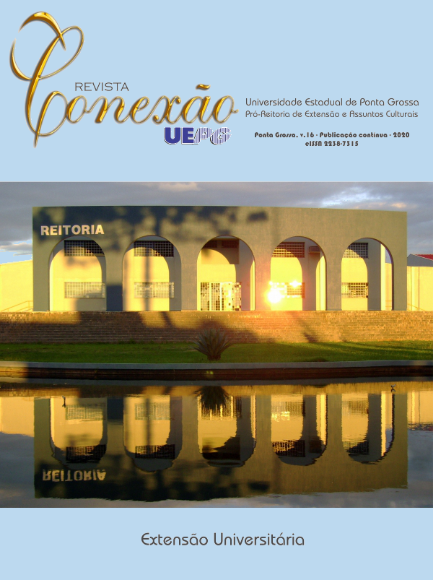INOVANDO PRÁTICAS - TRANSFORMANDO VIDAS: FORMAÇÃO DE AGENTES DE DESENVOLVIMENTO AMBIENTAL
DOI :
https://doi.org/10.5212/Rev.Conexao.v.16.13667.012Résumé
Este projeto de extensão objetivou formar populações tradicionais dos territórios Sertão do São Francisco, na Bahia, e Sertão do São Francisco, em Pernambuco, para a Educação Ambiental com vistas à convivência com o semiárido, na perspectiva de aprofundar as reflexões teóricas e práticas sobre problemas contemporâneos da sociedade, exercitando metodologias participativas que as capacitassem para a gestão dos seus negócios agrícolas, agrários e de outras naturezas. O currículo teve como referência principal a formação crítica para o desenvolvimento socioambiental e o modo de produção da vida, as relações sócio-históricas, políticas e culturais dos atores envolvidos, possibilitando a construção de espaços pedagógicos de aprendizagem para além da sala de aula, por meio da metodologia da alternância: tempo escola, tempo do exercício profissional e tempo comunidade. Os resultados foram 200 agentes de desenvolvimento ambiental formados e atuando nas suas comunidades, de forma sustentável, nas dimensões humana, técnica, ética, moral, política e estética.
Téléchargements
Références
ABROMOVAY, Ricardo. Paradígmas do Capitalismo Agrário em questão. Campinas, Hucitec, 2002.
BANCO MUNDIAL. Le développement au seuil du XX ème siècle. Paris. ESKA, 2000.
BRASIL Lei n. 9.795, de 27 de abril de 1999. Institui a Política Nacional de Educação Ambiental. Diário Oficial da União, Brasília, seção 1, p. 1-4, abr. 1999.
BRUNDTLAND, G. H. Comissão Mundial sobre Meio Ambiente e Desenvolvimento - 1988. Nosso Futuro Comum (Relatório Brundtland). Rio de Janeiro: Fundação Getúlio Vargas, 1988.
COMISSÃO MUNDIAL SOBRE MEIO AMBIENTE E DESENVOLVIMENTO (CMMAD). Nosso futuro comum. Rio de Janeiro: Fundação Getulio Vargas, 1991.
FAO-UNESCO. Educación para el desarrollo rural: hacia nuevas respuestas normativas. Um estudo conjunto de La FAO y La UNESCO. Roma, Paris, 2003.
KLIKSBERG, B. Falácias e mitos do desenvolvimento social. Brasília: UNESCO, Cortez Editora, 2002.
LACKI, P. Como enfrentar a crise da agricultura: lamentando os problemas insolúveis ou resolvendo os problemas solucionáveis? Roma: Papers da FAO, 2002.
LEFF, E. Saber ambiental: sustentabilidade, racionalidade, complexidade, poder. Petrópolis, RJ: Vozes, 2004.
LEFF, E. Ecologia, Capital e Cultura: a territorialização da racionalidade ambiental. São Paulo: Cortez Editora, 2009.
PÁDUA, S.; TABANEZ, M. Educação ambiental: caminhos trilhados no Brasil. São Paulo: Ipê, 2001.
RODRIGUES, N. Por uma nova escola: o transitório e o permanente na educação. São Paulo: Cortez Editora, 1997.
SACHS, I. In: NASCIMENTO, Elimar Pinheiro do; VIANNA, João Nildo (org). Dilemas e Desafios do Desenvolvimento Sustentável no Brasil. Rio de Janeiro: Garamond, 2007.
SAVIANI, D. Pedagogia histórico-crítica. 11. ed. Campinas, SP: Autores Associados, 2013.
SCOTTO, G. Desenvolvimento Sustentável. Rio de Janeiro: Vozes, 2007.
SORRENTINO, M.; TRAJBER, R. Políticas de Educação Ambiental do Órgão Gestor. Vamos cuidar do Brasil: conceitos e práticas em educação ambiental na escola/coordenação: Soraia Silva de Mello, Rachel Trajber. P.13-22.
Ministério da Educação, Coordenação Geral de Educação Ambiental: Ministério do Meio Ambiente, Departamento de Educação Ambiental: UNESCO, 2007.
Téléchargements
Publié-e
Numéro
Rubrique
Licence
a) Os autores mantêm os direitos autorais e concedem à revista o direito de primeira publicação, com o trabalho simultaneamente licenciado sob a Creative Commons Attribution License que permite o compartilhamento do trabalho com reconhecimento da sua autoria e publicação inicial nesta revista.
b) Ao submeter um artigo à Revista Conexão UEPG e tê-lo aprovado os autores concordam em ceder, sem remuneração, os seguintes direitos à Revista: os direitos de primeira publicação e a permissão para que a Revista redistribua esse artigo e seus metadados aos serviços de indexação e referência que seus editores julguem apropriados.
c) Os leitores são livres para transferir, imprimir e utilizar os artigos publicados na Revista, desde que haja sempre menção explícita ao(s) autor (es) e à Revista Conexão UEPG e que não haja qualquer alteração no trabalho original. Qualquer outro uso dos textos precisa ser aprovado pelo(s) autor (es) e pela Revista.

Este obra está licenciado com uma Licença Creative Commons Atribuição 4.0 Internacional.





